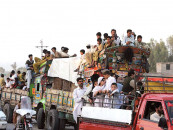No lessons learnt in forty years
Today is the fortieth anniversary of when Lt General Niazi surrendered to India and Bangladesh forces.

No lessons learnt in forty years
During the long-drawn civil war, thousands, if not hundreds of thousands, of people were tortured, raped and killed. The argument over how many people were exactly killed will continue, but what is important to recall is that the Pakistan Army, which was supposed to defend the borders of the country, went on a rampage. That is why the Bangladeshis observe March 26, 1971, the day when Pakistan declared war on its own people, rather than December 16, as their independence day.
The remainder of Pakistan, West Pakistan, almost immediately showed exemplary signs of amnesia, refusing to regret its role in the debacle and stubbornly rejecting to change its attitude. As a sign of defiance and, dare I say, insentitivity, Pakistan appointed General Tikka Khan, who was called the “Butcher of Bengal” by Time magazine for leading Operation Searchlight, as the chief of army staff in 1972, whereas this person should have been court-martialled for killing innocent civilians.
Similarly, we immediately forgot that the East Pakistan debacle was primarily caused by the unwillingness of the powers in Pakistan to allow the East Pakistanis to remain part of Pakistan on an equal footing — let us not forget that the six points of Mujibur Rahman were within the framework of a united Pakistan and not outside it. But we refused to accept that the country would only become strong if all ethnicities and regions were allowed autonomy within the federal framework. So, we charged the Sindhis with attempting to secede when they had only passed an act which gave official status to their own language — Sindhi — in 1972. In Balochistan, we went even further and launched yet another military operation against them in 1973 under General Tikka Khan, which lasted five years. Again, we unleashed our military on our own people, simply because they were demanding a share in national governance. Treating all parts of the federation honourably and giving them their fair share, is something which keeps evading us even now.
Deeply mired in conspiracy theories and imagined theories of ideology and identity, with an aversion to questioning and freethinking and hence lacking development, Pakistan is a country which is fast choking on its own vomit. It is as if we know that we are sick and are about to vomit, but rather than letting the bad stuff out and dealing with the disease, we try to keep it in so much so that we are well on our way to choking ourself to death. Better still, a section of our society, echoing the sentiments of Jinnah himself, wants to keep ‘its conscience clean’ and does not even want to acknowledge the sickness.
Let me leave you with one real life example of how we still refuse to even accept, let alone learn, from the East Pakistan debacle. In my Pakistan Studies class at Forman Christian College, I spent a whole week on the Bangladesh issue. Teaching them just the bare facts of the whole problem, I could see how uneasy most of the students were, some shocked by what they had learnt, some regretful, but still there were some who refused to even accept that some atrocities might have been committed. At one point, we had a heated debate in the class when a person refused to believe that a Bengali Muslim woman, whose first-hand account we had just read, had been repeatedly raped and tortured. Another student directly confronted this person and said, “Will you only accept her story if she gets raped in front of you?”
Published in The Express Tribune, December 16th, 2011.



















COMMENTS
Comments are moderated and generally will be posted if they are on-topic and not abusive.
For more information, please see our Comments FAQ